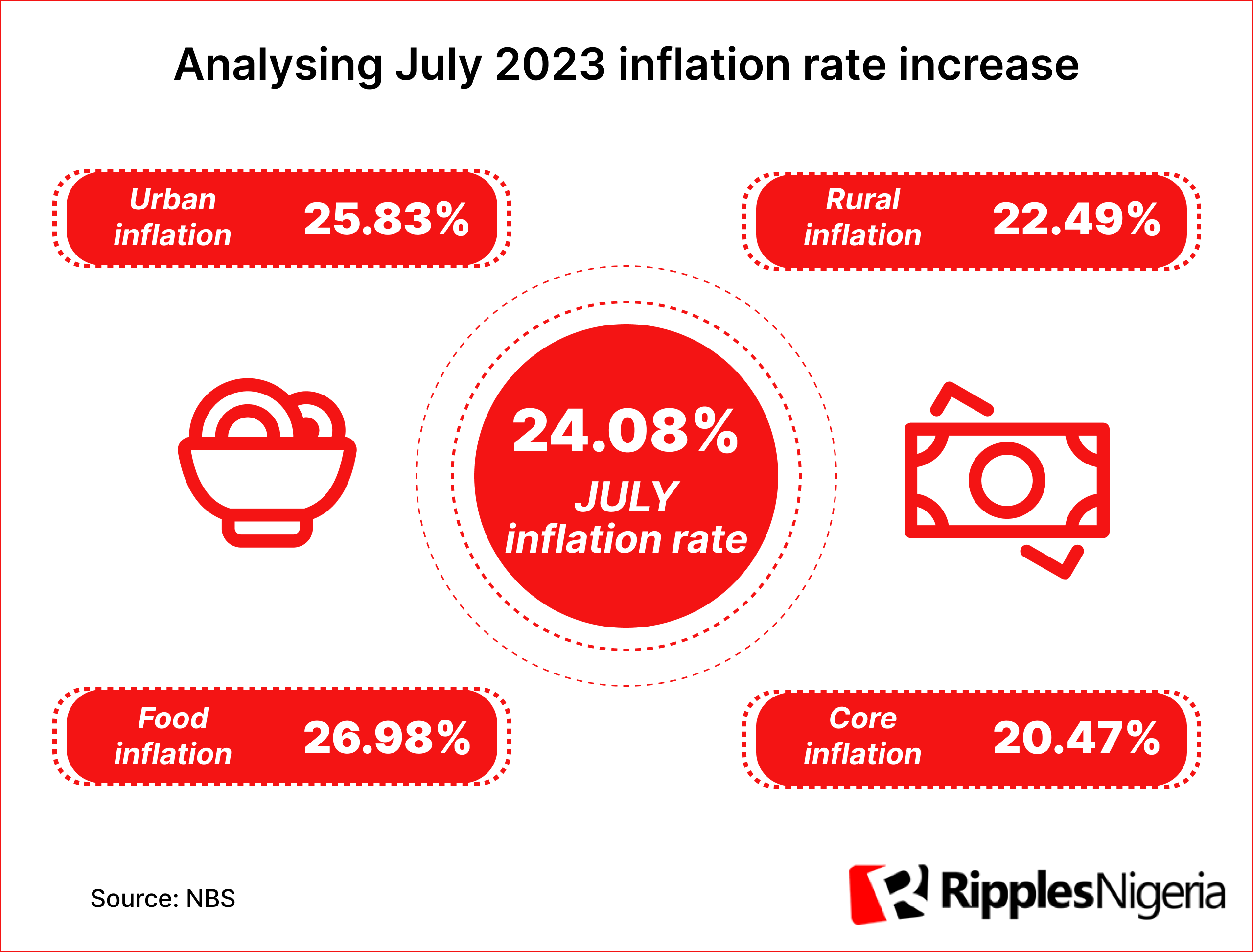Ripples Metrics
RipplesMetrics: Analysing July 2023 inflation rate increase

The National Bureau of Statistics (NBS) recently disclosed that Nigeria’s inflation rate rose from 22.79 per cent in June to 24.08 per cent in July 2023.
The data was contained in the Consumer Price Index report which measures the average change over time in the prices of goods and services consumed by people for day-to-day living.
This is the seventh consecutive increase reported since the beginning of 2023. Recall that the inflation rate increase has lingered since former president, Muhammadu Buhari, initiated a naira re-design policy at the beginning of the year which crumbled cash availability and transactions.
Upon his handover to a new administration in May, Bola Tinubu also enacted policies that stopped subsidies on petrol and devalued the naira in the exchange rate market. These policies have increased the inflation rate from 21.82 per cent in January 2023 to 24.08 in July.
RipplesMetrics reported how Tinubu’s economic policy affected the country 60 days after assuming office as president. Also, RipplesMetrics examined the price changes of Fuel since 1999 and how inflation had fared in the first half of 2023.
A closer look at the data showed that this is the first time in three years that Nigeria’s inflation had risen consecutively for seven months. This occurrence was last witnessed in 2020 due to the COVID-19 pandemic and in 2016 when the country went into recession under Buhari.
In a recent broadcast, the president said the government plans to kick-start different schemes across the manufacturing and production sector to ease the economic burden imposed by the policies enacted. However, there are concerns that the rising inflation rate and foreign exchange might affect the intent behind the initiatives.
July Inflation Rate
According to NBS, the rate is 1.29 per cent higher when compared to June 2023 headline inflation rate which was 22.79 per cent.
NBS said, “On a year-on-year basis, the headline inflation rate was 4.44% points higher compared to the rate recorded in July 2022, which was 19.64%. This shows that the headline inflation rate (year-on-year basis) increased in July 2023 when compared to the same month in the preceding year (i.e., July 2022).”
READ ALSO:RipplesMetrics: Tinubu’s ministerial nominations, the important numbers at a glance
On urban inflation, NBS said that the inflation rate stood at 25.83 per cent. This is 5.74 per cent points higher compared to the 20.09 per cent recorded in July 2022. On a month-on-month basis, the urban inflation rate was 3.05 per cent in July 2023, this was 0.75 per cent points higher compared to June 2023 (2.31 per cent).
On rural inflation, the data agency reported that the inflation was, in July 2023, 22.49 per cent on a year-on-year basis; this was 3.26 per cent higher compared to the 19.22 per cent recorded in July 2022. On a month-on-month basis, the Rural inflation rate in July 2023 was 2.74 per cent, up by 0.78 per cent points compared to June 2023 (1.96 per cent).
However, the bureau said that the food inflation rate in July 2023 was 26.98 per cent and this was caused by increases in prices of Oil and fat, Bread and cereals, Fish, Potatoes, Yam and other tubers, Fruits, Meat, Vegetable, Milk, Cheese, and Eggs.
It said, “On a year-on-year basis, which was 4.97 per cent points higher compared to the rate recorded in July 2022 (22.02 per cent). On a month-on-month basis, the Food inflation rate in July 2023 was 3.45 cent, this was 1.06 per cent higher compared to the rate recorded in June 2023 (2.40 per cent).”
However, the “All items less farm produces and energy” or Core inflation, which excludes the prices of volatile agricultural products and energy stood at 20.47 per cent in July 2023 on a year-on-year basis; up by 4.41 per cent when compared to the 16.06 per cent recorded in July 2022.
The highest increases were recorded in prices of Passenger Transport by Air, Passenger Transport by Road, Vehicle Spare Parts, Medical Services, Maintenance, and repair of personal transport equipment etc.
However, the Institute of Chartered Secretaries and Administrators of Nigeria had counselled the Federal Government and the Central Bank of Nigeria (CBN) to find other means of controlling inflation in the country other than raising the Monetary Policy Rate (MPR).
By James Odunayo
Join the conversation
Support Ripples Nigeria, hold up solutions journalism
Balanced, fearless journalism driven by data comes at huge financial costs.
As a media platform, we hold leadership accountable and will not trade the right to press freedom and free speech for a piece of cake.
If you like what we do, and are ready to uphold solutions journalism, kindly donate to the Ripples Nigeria cause.
Your support would help to ensure that citizens and institutions continue to have free access to credible and reliable information for societal development.
























